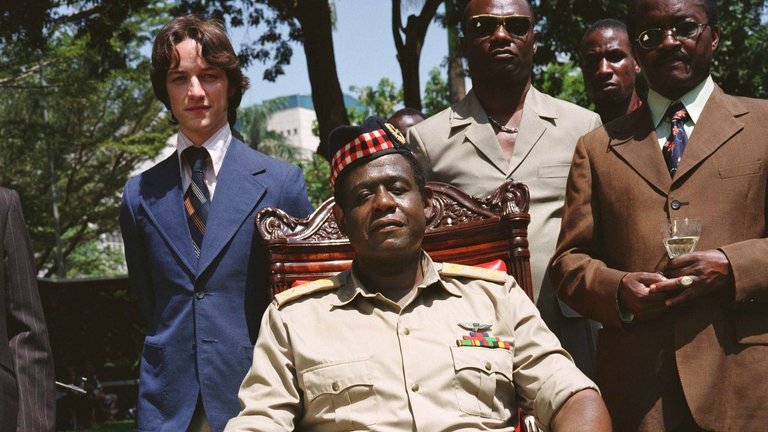Retro Film Review: The Last King of Scotland (2006)

For much of the 20th century, Hollywood, and Western cinema in general, treated Africa as nothing more than an exotic setting or, even worse, the antithesis of everything that was “civilised” and “proper” in the West. This attitude, in certain forms, managed to survive even in later, more “politically correct” times, at least judging by The Last King of Scotland, a 2006 period drama directed by Kevin Macdonald.
The film is based on a 1998 novel by British author Giles Foden. The plot begins in 1970 when a young Scottish doctor, Nicholas Garrigan (played by James McAvoy), driven by an adventurous spirit, decides to start his career in Uganda. His arrival coincides in 1971 with a coup in which Idi Amin (played by Forest Whitaker), the commander of the Ugandan army, overthrew the corrupt regime of President Obote and took power. The charismatic Amin, who promises reforms and the creation of a new nation, makes a good impression on Garrigan, and by chance, the new president meets the young doctor. Amin and Garrigan become good friends, and the young Scot becomes not only the president's physician but also a close political advisor. However, over time, Garrigan finds it increasingly difficult to ignore the brutality and ruthlessness of Amin's regime towards political opponents, as well as the suggestions from the British intelligence service to poison Amin. Things become further complicated when Garrigan begins a romantic relationship with Kay (played by Kerry Washington), one of Amin's wives.
Despite featuring prominently on the poster and other promotional material, viewers would quickly see that the main character of the film is not Idi Amin but Garrigan. Thus, The Last King of Scotland continues the Hollywood tradition of depicting personalities and events in Africa and other "exotic" parts of the world not from the perspective of the natives but from that of white observers. An additional reason for this is that "selling" Idi Amin to the average white, or American, audience was beyond the creative capabilities of today's Hollywood. Indeed, it was difficult to create sympathy for the character of Idi Amin—who, due to the hundreds of thousands of people killed during his rule, is regularly placed alongside the greatest villains in world history such as Nero, Torquemada, Hitler, Stalin, and Pol Pot. At the same time, his clownish behaviour was far from the standards for "polished" and refined Hollywood villains like Hannibal Lecter.
Thus, Garrigan became not just a hero but also the film's protagonist, with screenwriters Peter Morgan and Jeremy Brock drastically deviating from the literary source where the protagonist is described as a ruthless cynic willing to exploit his employer's mental illness to gain as much wealth and power as possible. The novel is, of course, much closer to historical truth than the film, given that the fictional character Garrigan was based on the real figure of Bob Astles, a former British soldier and close associate of Amin who earned the nickname "White Rat" during Amin's reign of terror and, following the dictator’s fall from power in 1979, spent several years in prison for complicity in Amin's crimes. Rise and Fall of Idi Amin, a biopic by Sharad Patel, filmed in 1981 while memories of Amin's era were still fresh, is, despite its weaker direction, acting, and budget, a far more authentic treatment of the same theme.
However, besides the commercial and dramaturgical aspects, there is another reason why the bloody reality of Amin's Uganda was subjected to Hollywood sugarcoating. In the film, the noble protagonist, just like his colonialist ancestors, takes on the "white man’s burden" and attempts to save the oppressed black people through direct action in the form of a fictional assassination plot. All of this is, in fact, not so different from the doctrine promoted by Tony Blair and George W. Bush, according to which great Western powers had not only the right but also the moral duty to intervene militarily to protect and promote human rights and liberal democracy in the Third World. When one considers the similarities of this semi-fictional story to the justifications used by former imperialist enslavers of Africa, or early 21st-century Neocon liberators of Iraq, The Last King of Scotland, which should be recommended mainly on the account of McAvoy and Whitaker’s acting, becomes much darker than its creators intended.
RATING: 5/10 (+)
Blog in Croatian https://draxblog.com
Blog in English https://draxreview.wordpress.com/
InLeo blog https://inleo.io/@drax.leo
Hiveonboard: https://hiveonboard.com?ref=drax
Rising Star game: https://www.risingstargame.com?referrer=drax
1Inch: https://1inch.exchange/#/r/0x83823d8CCB74F828148258BB4457642124b1328e
BTC donations: 1EWxiMiP6iiG9rger3NuUSd6HByaxQWafG
ETH donations: 0xB305F144323b99e6f8b1d66f5D7DE78B498C32A7
BCH donations: qpvxw0jax79lhmvlgcldkzpqanf03r9cjv8y6gtmk9